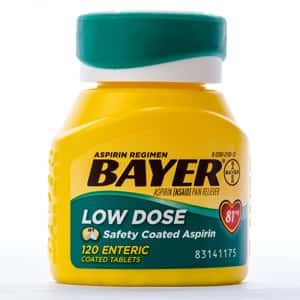
Many people take low dose aspirin, usually 81 mg, to prevent cardiovascular complications. Doctors frequently prescribe aspirin after a patient has had a heart attack or after a stent has been placed in a coronary artery. But is it safe to stop this medicine? A new study suggests that stopping aspirin suddenly may have grave consequences (Circulation, online, Sept. 26, 2017).
Stopping Aspirin and Cardiovascular Events:
A large Swedish study used medical records and the national death registry to answer the question whether stopping aspirin can lead to dangerous cardiovascular outcomes. In Sweden, low-dose aspirin is available only by prescription. As a result, the investigators were able to determine who was taking the drug and who stopped.
Between 2005 and 2009, more than 600,000 people over 40 were taking low-dose aspirin. During three years of follow-up, about 15 percent of these people stopped taking their aspirin, and more than 62,000 were hospitalized or died from a heart attack or stroke.
What They Found About Stopping Aspirin:
In analyzing the data, the researchers discovered that people who had quit their low-dose aspirin without a clear medical reason were 37 percent more likely to suffer such an event.
Here’s what the researchers reported:
“In this large nationwide patient cohort, discontinuation of long-term low-dose aspirin was associated with a >30% higher risk of cardiovascular events, corresponding to an additional cardiovascular event observed per year in 1 of every 74 patients who discontinue aspirin. The risk appeared to increase as soon as the patients discontinued aspirin, with no safe interval.”
People who were taking aspirin because of a previous heart attack had a higher rate of heart attack, stroke or death if they stopped. In that situation, as many as 1 in every 36 of these patients suffered a cardiovascular complication.
The Swedish investigators characterized the risk this way:
“Aspirin discontinuation appeared especially perilous among patients with previous cardiovascular disease…”
Stopping Aspirin and Rebound Risk:
The Swedish researchers note that “experimental studies have suggested a rebound effect after aspirin discontinuation…” This may increase the risk for blood clot formation.
They pose an important but unanswered question:
“For patients undergoing planned surgery or other procedures, it is unknown whether treatment gaps >7 days or <24 hours before the procedure are safe. For patients discontinuing aspirin therapy, it is unknown whether or when the rebound effect happens. In addition, for patients with poor adherence, any rebound effects may be in play more or less continuously.”
Their Conclusions About Stopping Aspirin:
What are we to make of this new research? The authors conclude:
“Among long-term users of low-dose aspirin, discontinuation of aspirin in the absence of major surgery or bleeding was associated with a >30% increased risk of cardiovascular events. The risk increased shortly after discontinuation. These findings can help policymakers focus on simple measures to ensure treatment persistence with a cheap medication like aspirin with substantial public health gains.”
Other Research on Stopping Aspirin:
The most recent Swedish research is not the first study to report that stopping aspirin suddenly may increase the risk for a heart attack. Not surprisingly, aspirin, even in low doses, can lead to severe stomach irritation. Sometimes low-dose aspirin can cause bleeding ulcers. In such cases physicians almost always stop the aspirin immediately.
One small study in the journal Clinical Gastroenterology and Hepatology (Jan., 2013) reported:
“In patients with cardiovascular disease, discontinuation of low-dose aspirin therapy after peptic ulcer bleeding increases risk of death and acute cardiovascular events almost 7-fold.”
Needless to say, such results put patients between a rock and a hard place. A bleeding ulcer can turn into a life-threatening event. But suddenly stopping aspirin appears to pose scary cardiovascular complications.
The authors of this research state the dilemma:
“Balancing between the cardioprotective effect of aspirin and the increased risk of rebleeding associated with aspirin use requires a careful clinical tradeoff.”
They go on to conclude:
“in patients with cardiovascular comorbidities who are treated for peptic ulcer bleeding, aspirin therapy should not be discontinued at the time of discharge from hospital.”
What Should Patients Do?
We encourage any patient taking aspirin for its heart protective effects to consult with a knowledgeable specialist before stopping aspirin. Every situation is different, so any recommendation needs to be tailored to each patient’s special needs.
This is especially important prior to surgery. Physicians have been wrestling with the question about stopping aspirin prior to surgical procedures for years. A review in the International Journal of Surgery (online, Nov. 15, 2013) asked the following question:
“…should patients on acetylsalicylic acid (ASA) for secondary prevention stop or continue the medication prior to elective, abdominal surgery.”
After reviewing the available literature these authors conclude:
“…it appears that continuing ASA isn’t associated with excessive bleeding. Further adequately powered trials with well-defined end points are needed to answer this important clinical question.”
The People’s Pharmacy Perspective:
It is sad that more research is needed to answer the critical questions of:
- Should aspirin be discontinued, especially in heart patients?
- If aspirin should be stopped, what is the best way to do that?
- Is there a rebound blood clotting reaction to stopping aspirin?
- Is there any way to prevent a heart attack or stroke if aspirin is discontinued?
In the meantime, patients will need to ask their doctors about this controversy. Some surgeons will recommend that aspirin be stopped at least a week before they operate. Others may suggest that a day or two is sufficient. As far as we can tell, there is no one-size-fits-all answer to this quandary. That is why it is critical to have a meaningful conversation about the pros and cons of aspirin before any procedure.

